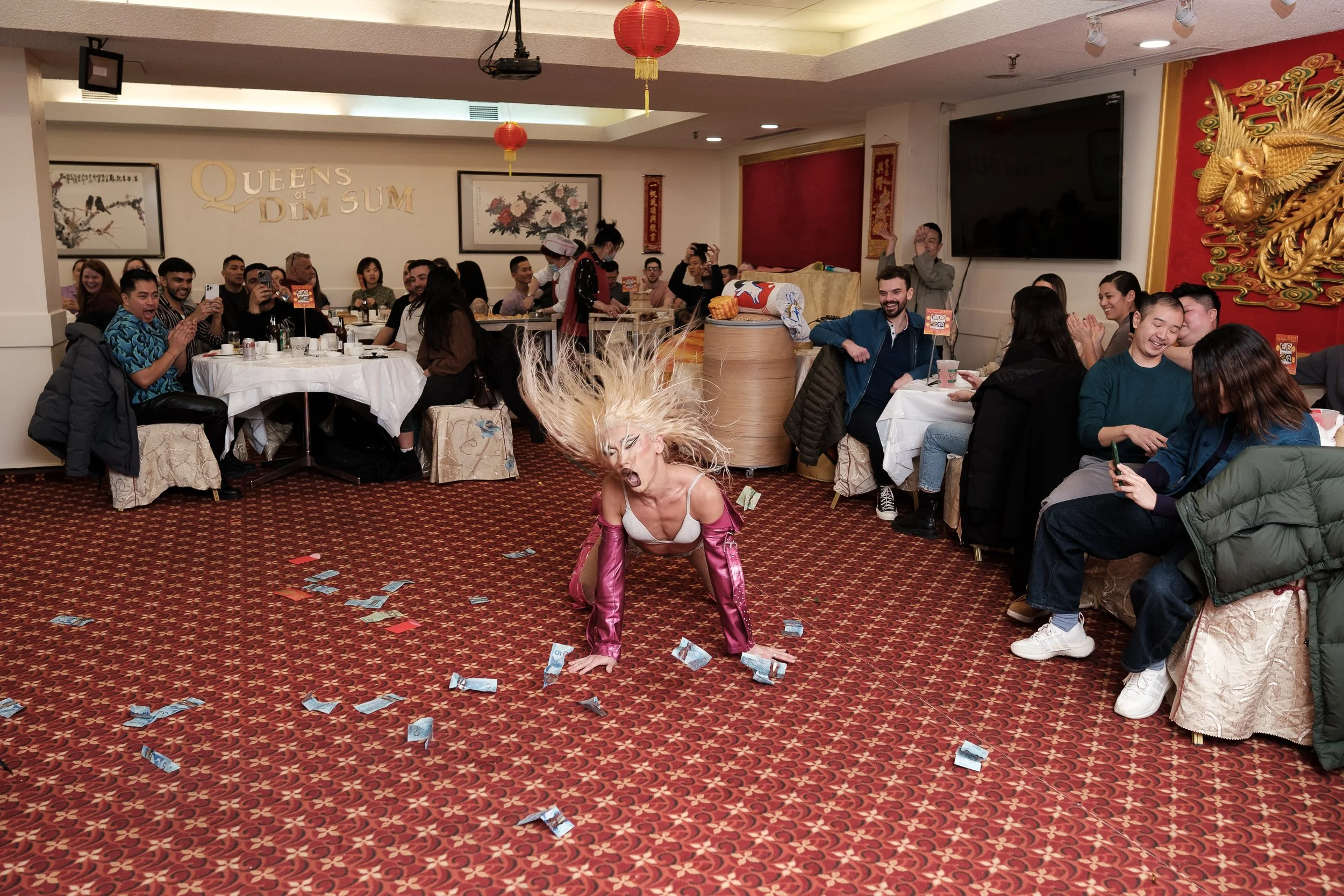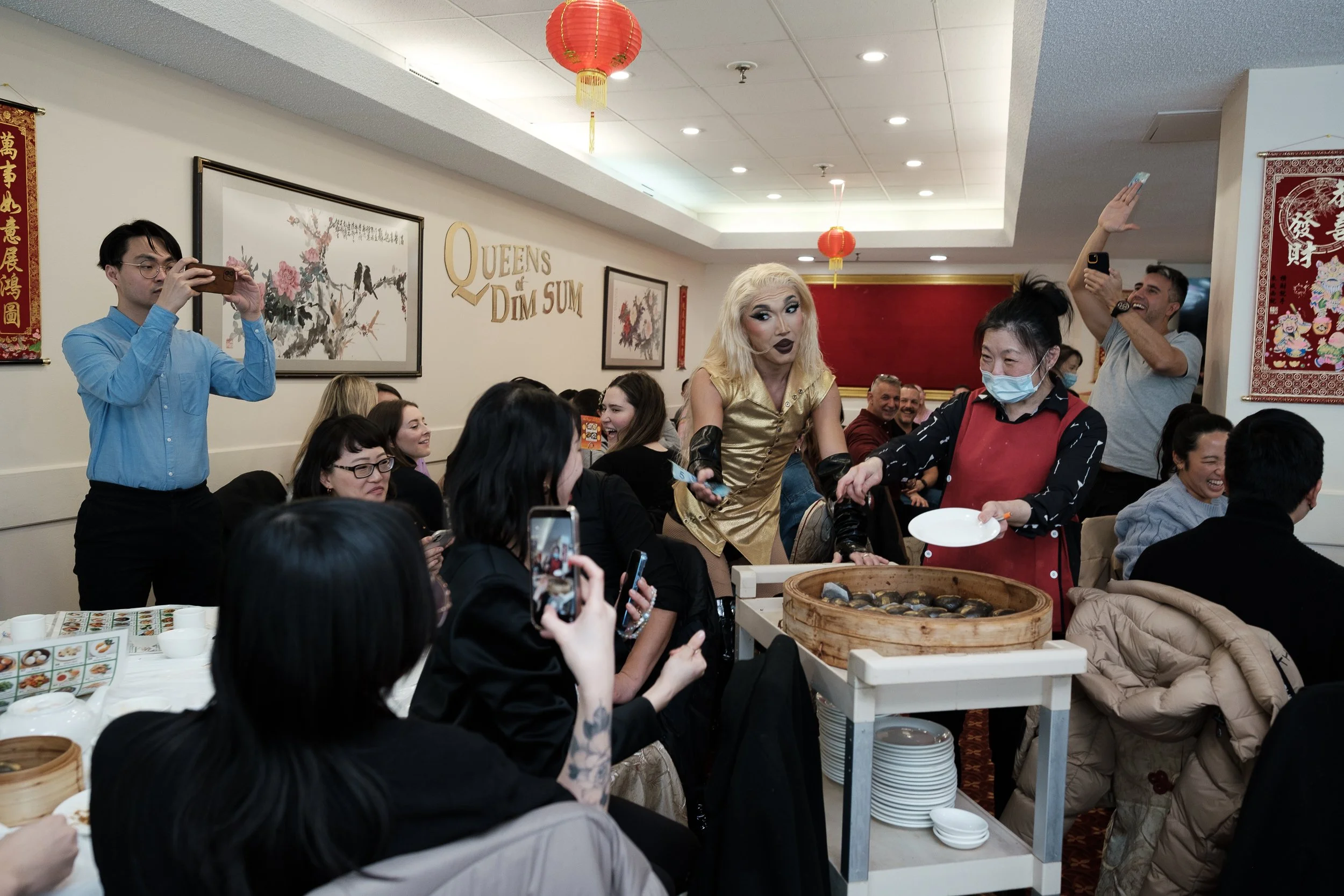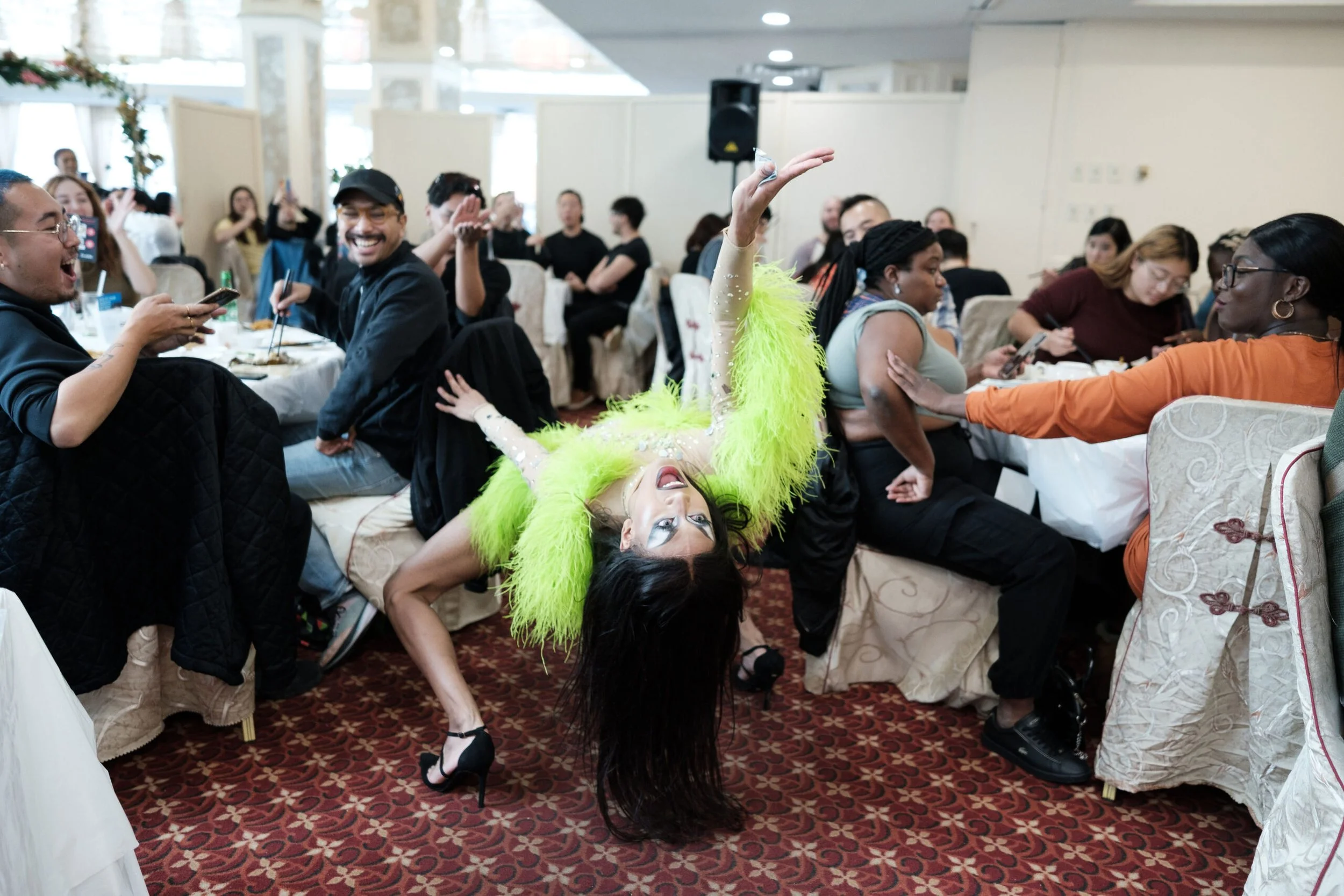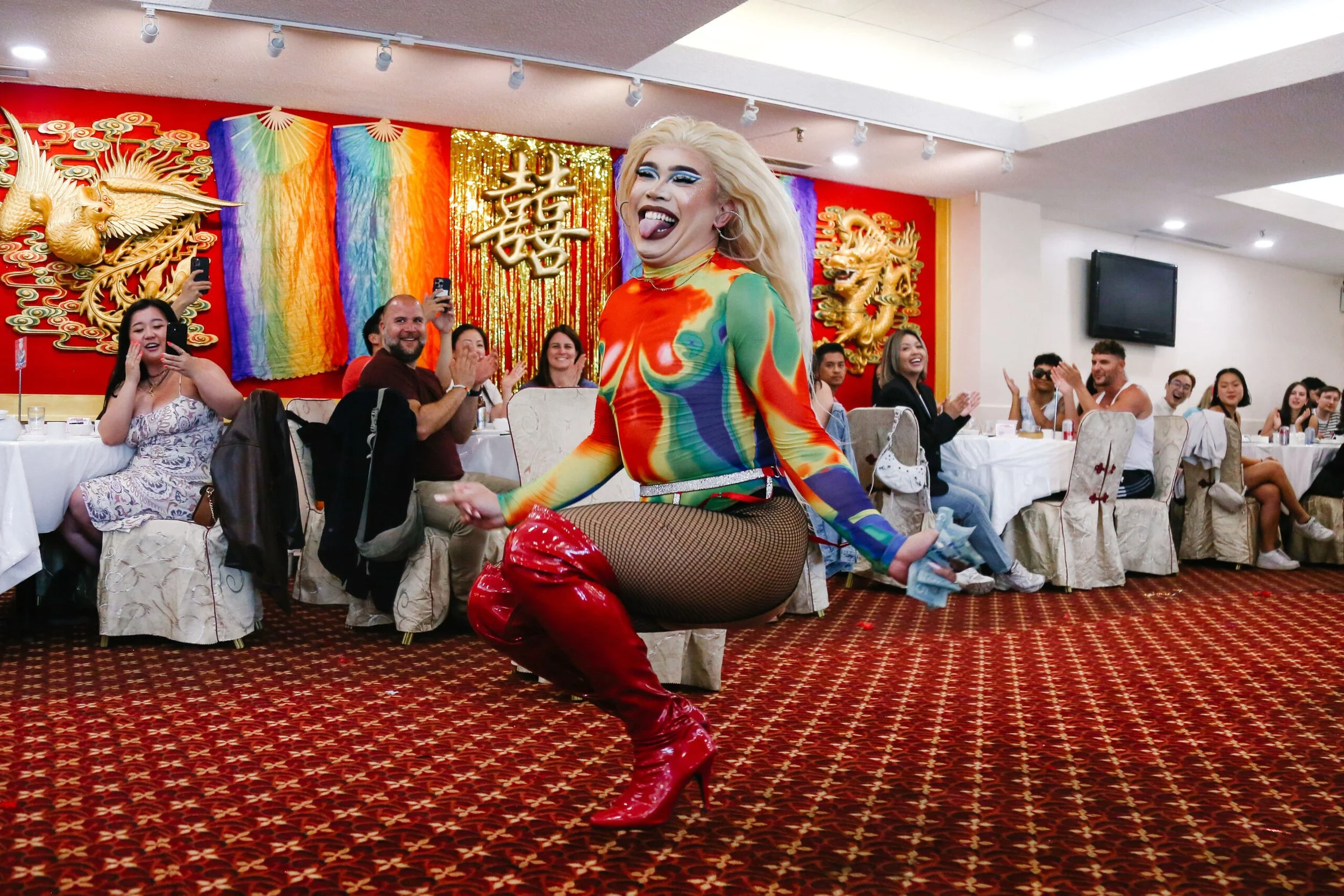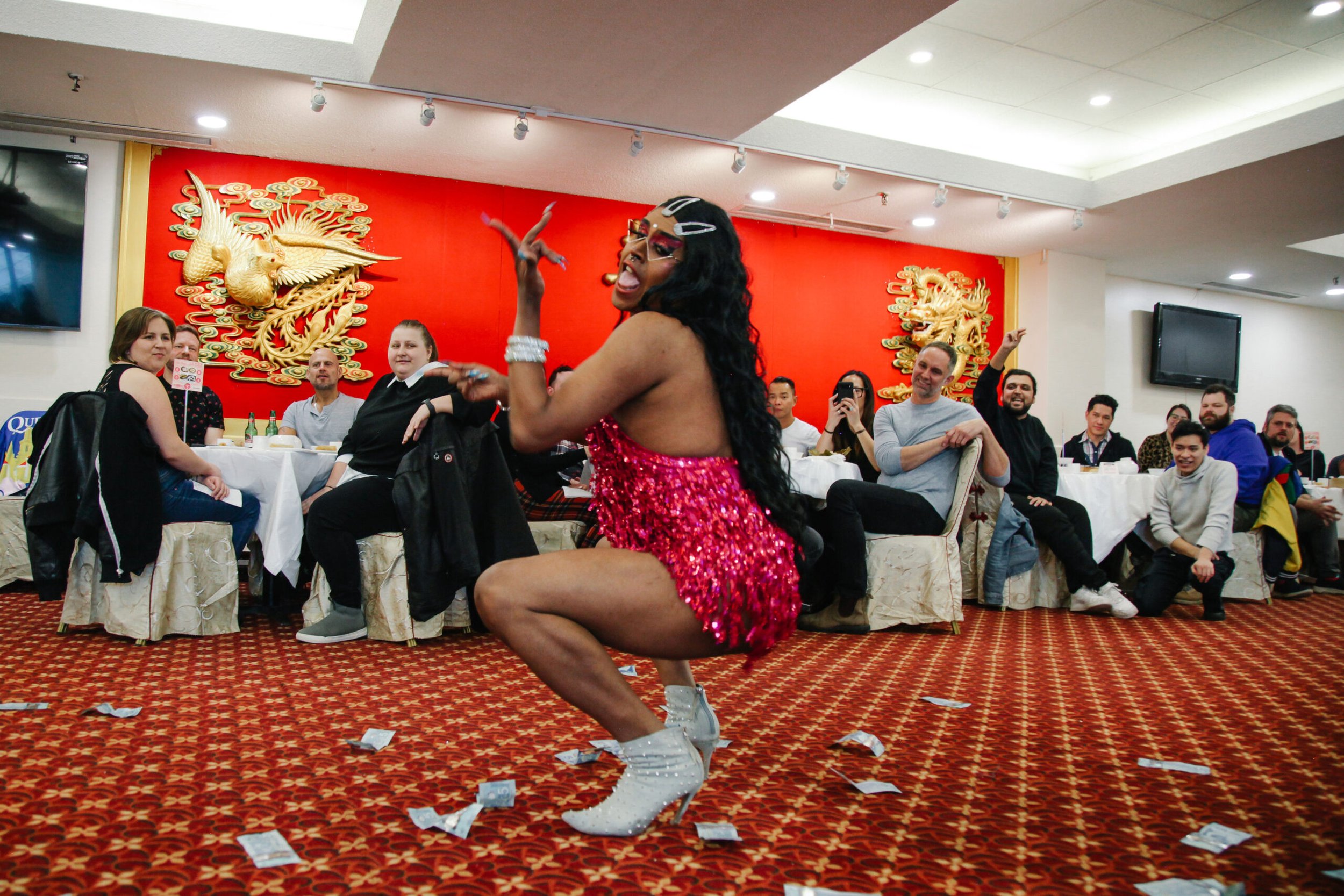How the Queens of Dim Sum are Serving Up Queer Culture and Asian Heritage
How an unexpected collaboration is preserving Asian heritage and queer culture.
Drag performer Star slaying at a Queens of Dim Sum event at Sky Dragon dim sum restaurant in Toronto. (Photo: @postyism)
The scent of jasmine tea and freshly steamed dumplings fills the air as drag performer Summer Buffet, lip-syncs to Paula Tsui’s Xi Qi Yang Yang (喜氣洋洋), a 1979 song that once echoed through Hong Kong living rooms. A dim sum server glides between tables, her warm smile reflecting the energy of the crowd. As Summer Buffet sways to the melody of a Cantopop classic, Asian elders from a few tables away glance over, their expressions shifting from surprise to quiet recognition.
For three decades, Sky Dragon has been a staple in Toronto’s Chinatown, serving dim sum to families, friends and longtime regulars. But in a neighbourhood increasingly shaped by gentrification, holding onto tradition isn’t just nostalgia—it’s resilience. Enter Queens of Dim Sum (QoDS), the monthly drag show co-founded by Ryan Tran and Sum Wong, transforming the restaurant into a space where heritage and queerness collide.
Drag performer Destiny at a Queens of Dim Sum event at Sky Dragon. (Photo: Calvin Cheung)
Across North America, Chinatowns are fighting for survival against rising real estate prices and shifting city priorities. Even the practice of traditional dim sum carts is fading in Canada, with a handful of restaurants like Sky Dragon keeping it alive. But here, tradition isn’t just being preserved—it’s taking on new life.
“Drag is a very accessible way for allies and straight folks to experience queerness, to see what it is and how queer people express themselves,” says Tran, adding that for performers, it’s also a way to reclaim and share identity through music, culture and aesthetics.
Kreme Inakuchi at Queens of Dim Sum (Photo: Linda Le)
Long before QoDS, its co-founders were already creating spaces for queer Asian Canadians. Tran spent years working with LGBTQ+ organizations like Asian Community AIDS Services (ACAS), the same group that once helped him come out. Nearly two decades ago, Sum Wong—also known as DJ Sumation—launched AsianXpress, a queer Asian club night in Toronto that drew a thousand people at a time.
Though it folded during the pandemic, Wong kept searching for ways to uplift and gather the community. As it turned out, Tran had the same idea, inspired by dim sum drag brunches in Vancouver and Chicago. Having attended and performed at Wong’s legendary events as part of a dance crew, he knew exactly who to call. Wong didn’t need much convincing either; after Tran reached out over Facebook, their initial chat over bubble tea quickly evolved into a planning meeting for the first phases of the project. Between their combined experience and deep roots in the queer Asian community, putting together the pieces for a successful drag brunch felt seamless, a testament to their easy working relationship.
When Tran and Wong set out to launch QoDS, they knew the event had to be more than just a show, but a platform. “When we were planning our first event and making a list of all the Asian drag queens and kings, there were only two that had long-standing experience of 10, 20 years or more—Lou Lou and Sofonda,” says Wong. “We knew we needed a space like this where the other queens could practice, gain experience and find who they are as artists.”
Drag performer Destiny serving up dim sum… and looks. (Photo: Calvin Cheung)
Finding the right venue, however, was another challenge. Chinese restaurants, with their built-in sound systems for wedding banquets, were ideal stages, but securing one that would welcome a queer event was uncertain. Sky Dragon seemed like the perfect fit; its owner Charlie Lin had previously hosted ACAS workshops. Still, there was hesitation. “He is, you know, a middle-aged older uncle—we didn’t know what his views were,” Tran admits.
Rather than risk rejection, they decided to keep booking details vague. “We couldn’t really describe drag in Chinese,” Wong recalls. But any doubts faded on the day of their first show in 2022. As queens danced between tables, the restaurant staff looked on in amazement—one performer even did a split in front of a dim sum cart. “The chefs stopped cooking to see what was going on before running back to the kitchen,” Wong laughs.
More surprising was Lin’s reaction. “Some of his regulars told him, ‘This is wrong, you shouldn’t be doing this,’” Tran says. “But he stood up for us and said, ‘No, I’m gonna keep doing this.’”
For many queer Asian performers and audiences, spaces like QoDS are more than just entertainment— they’re a rare and necessary celebration of identity. Despite growing mainstream visibility, Asian drag artists remain underrepresented in North America. Out of the 37 drag queens featured in New York Magazine’s 2019 cover story of the most powerful drag performers in America, only three were Asian. Research also shows that whiteness is often positioned as the default LGBTQ+ experience, with Asian culture being viewed as less inclusive relative to the United States’. A 2020 GLAAD and P&G study found that exposure to LGBTQ+ representation increases acceptance by nearly 45 percent, proving that visibility can actively shape societal perceptions.
QoDS offers that representation while creating something just as vital: a sense of belonging. The show has drawn audiences of all ages, from children to a 90-year-old couple celebrating their anniversary. It even inspired a gay couple to host their wedding reception at Sky Dragon. “They knew Sky Dragon was a safe space,” Tran recalls. “Charlie’s wife [who co-owns Sky Dragon] even hand-cut Double Happiness characters and the couple’s names to hang on the wall.”
Aria Doll bringing the house down at a Queens of Dim Sum event. (Photo: Calvin Cheung)
Moments like these are especially meaningful in a community where cultural and familial expectations often make it difficult to embrace one’s LGBTQ+ identity; for instance, a study showed that 62 per cent of Asian Americans struggle with that balance. But events like QoDS serve as a reminder that queerness and heritage aren’t mutually exclusive, but coexisting forces that can strengthen each other. Drag itself has become a powerful vehicle for reclaiming heritage, particularly outside the traditional club and bar scene.
At every QoDS show, drag performers weave Asian traditions, language, and pop culture into their acts. Drag king Full Blown Father, has drawn from Chinese opera, using bold, expressive makeup as a bridge between classical performance and contemporary drag. Others like Aurora Matrix, have paid tribute to icons like Coco Lee, lip-syncing to Crouching Tiger, Hidden Dragon, while Star channelled early 2000s nostalgia with a Filipino-inspired dance to The Spaghetti Song. “Drag brunch is a great way to expose queerness to other generations,” Tran says. “Sometimes a performer will pay homage to their family and culture, and it’s so heartwarming to see.”
Star performing at Queens of Dim Sum at Sky Dragon. (Photo: AP Studio)
But beyond performance, spaces like QoDS provide something just as essential—mentorship. “I think it’s important we keep something like this for [performers] because they need to grow and have mentors,” says Wong. “And by meeting other drag performers, they will get some help and mentorship from more senior drag performers and ones that get booked a lot.”
Since its inception, QoDS has only grown. Wong and Tran expanded their vision with Drag Phở the Win, a second drag brunch featuring lip-sync battles at Dzô Viet Eatery. While there’s no rush to scale up, they’re open to fresh opportunities. “From the beginning, our core value was to support drag performers and the community,” Tran says.
Drag performer Sanjina at Sky Dragon. (Photo: AP Studio)
But more than anything, they hope to maintain consistency, keeping QoDS as a home for performers while ensuring space for emerging talent. “I want them to feel safe to do whatever they want to do,” Wong adds. “We also want to make sure we have spots for new people to perform.”
They’ve even thought about taking QoDS to other public spaces, including Pacific Mall and the annual Toronto Chinatown Festival, bringing drag to the heart of the wider Asian community in the city. Nevertheless, QoDS is already reshaping Chinatown’s evolving identity. In a neighborhood where change can feel like loss, the show tells a different story—one where tradition makes space for the present while honoring the past.
For those attending a QoDS show for the first time, Tran sums up what to expect: “Pure joy, queerness and Asianness. That queer Asian joy—being seen, feeling represented. In the performer, they see themselves.”
QoDS holds regular performances at Sky Dragon and Dzô Viet Eatery. Follow along for all upcoming events on Instagram and Eventbrite.


